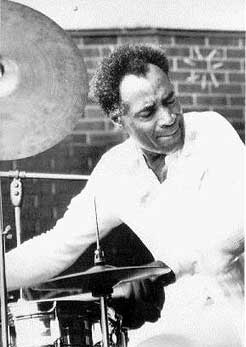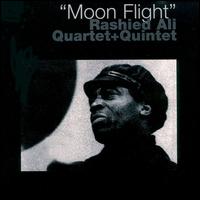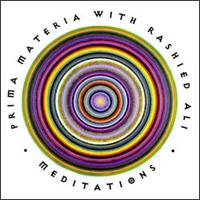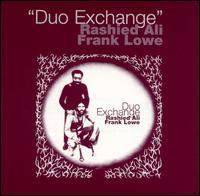

Courtesy of Rashied Ali

Knitting
Factory

Knitting
Factory

Knitting
Factory
A FIRESIDE
CHAT WITH RASHIED ALI
I was
really into Elvin because he was the featured drummer on A Love Supreme.
I still am to some degree (having spent a hundred and fifty bucks on his
Mosaic Blue Note box), but when it comes to Trane drummers, I appreciate
what Rashied Ali brought to the table. I can't imagine another drummer
being able to duel with Trane on Interstellar Space. Or how killer is
the practically hour long "My Favorite Things" on the Live in
Japan record? I get the best of both worlds on Meditations (both Ali and
Jones play). Ali continues to pay tribute to Trane's legacy. A classic
Touchin' on Trane (Charles Gayle and William Parker), a fine In the Spirit
of John Coltrane (Sonny Fortune), and a rendition of Meditations with
his Prima Materia band. The force is strong in this one my friends. I
sat down with Rashied and the drummer spoke about his respect for Trane
and his efforts to be the standard bearer, as always, unedited and in
his own words.
FRED JUNG: Let's start from the beginning
RASHIED
ALI: Well, actually my family was a very musical kind of a family. My
mother and her four sisters were all piano players and then my grandmother
was a minister and she had a Baptist church, sort of a little, small corner
church. Her daughters sang and played at the church. And my father, he's
a music lover. He's a jazz buff. He likes music. His first cousins, which
were the Rices, Charlie Rice and Bernard Rice, they were both drummers.
Charlie Rice was more professional. He played with people like Dizzy Gillespie
and John Coltrane, people like that in Philadelphia years ago. I just
was around music all my life and so it was just natural that I would be
a musician I guess. I started with piano, but I didn't really get that
far. I learned enough just to read music and play the piano. Then I wanted
to be a trombone player, but I never got that. I wanted to play the trumpet.
I was going through a lot of different changes. Actually, the drums just
really took over being around my cousins and friends that I knew. My aunt
married a drummer also. I just sort of gravitated towards the drum set.
But actually, I started playing congas and hand percussion instruments
before I really became sort of professional in drums.
FJ: How did you come to play with Trane?
RASHIED
ALI: Actually, I was born and raised in Philadelphia and John Coltrane
lived in Philadelphia all of his young life. He moved from North Carolina
as a kid up to Philly. So actually, I first met John in Philadelphia back
in '59, '58, while he was still playing with Miles Davis, but I wasn't
considering myself as really good enough to play with John Coltrane in
those days. I admired the man so much and I would go hear him play when
he was working with Miles Davis and he lived about four blocks, five blocks
away from me and I used to go sit on his porch and listen to him practice
because Mrs. Alice Coltrane wouldn't let us go upstairs, that's his mom,
while he was practicing and stuff like that and so we would just sit outside
and listen to him and then we would leave. When I really got enough experience
to try and play with him, he was down in Philadelphia and I asked him
a couple of times if I could sit in with him, but he said, "Not right
now." He encouraged me to go to New York and stuff like that and
so I did. I came to New York and then I got a chance to sit and play with
him in New York and the rest is history. That is when I joined the band
in 1965.
FJ: Was it competitive between Rashied Ali and Elvin Jones?
RASHIED
ALI: Not at all, Fred. In those days, things were kind of different and
I was an upstart. I was just trying to get my rhythm off and so there
was a few misunderstandings between the old band and the new band. Elvin
was one of my heroes. He was one of the guys that really got me started
to play something different. By listening to Elvin Jones, I was able to
find Rashied Ali.
FJ: Many who document the music have cheapened the innovations of Coltrane's
lessening the impact or in some circumstances, ignoring the heavyweight's
later years entirely.
RASHIED
ALI: Yeah, that's a shame too, Fred, because that is a stepping stone
to what is going on right now. Well, actually, I wouldn't say it was ignored
that much. At the time, I would like to also think of myself as really
working with John and helping him create that sound. It was just that
John was really instrumental in that kind of music because even with his
former quartet with Elvin. They were playing very avant-garde kind of
music and the people dug it because he had this thing going with Miles
Davis and with his band. When he really, really decided that he wanted
to get out of chord changes and get out of time, rhythm, and meters, that
is when things started changing as far as the public is concerned. That
went on for a while, but it was actually embraced by a lot of musicians
while John was alive because when he was alive, I played with a lot of
people like Sonny Rollins and Grachan Moncur and Don Byas and they were
embracing the free kind of music, Ornette Coleman, Cecil Taylor. That
stuff was really happening in the Sixties and when John left us here,
that is when the music made a change. Miles Davis went to Bitches Brew
and they got into a fusion thing and all kinds of different things happened
and it just sort of kind of dropped out of the public's eye, but not for
me because I stayed in the game and I'm still in it now, Fred. Right now,
I see the music is resurging again. It is starting to come up a little
bit more because I've been doing a lot of playing lately and it is not
that I don't play conventional jazz because I do enjoy playing it, but
I'd much rather play more experimental stuff than conventional stuff.
I think when John was here, the music was hanging in there, but a lot
of people were so used to him playing certain kind of things. I think
if he had stayed here, it would be the music hat we'd be playing today.
It is actually because I'm still here and the music right now, a lot of
youngsters are embracing this music and I've been doing pretty well with
it right now.
FJ: Did you continue to legacy with Alice?
RASHIED
ALI: For a little while. I played with Alice for about a year or so after,
maybe a couple of years after Coltrane passed. I did most of the stuff
with my own band. I had a lot of different bands in those times and not
only did I have different bands, I also had a club that I opened in New
York called Ali's Alley. That club lasted for about five or six years
and that way, I was able to play a lot with my band and different bands
that I put together and getting other avant-garde bands to play because
it was at a point in the early Seventies where there wasn't too many places
out here that an avant-garde band could play. So Ali's Alley was one of
those places. That went from 1973 to 1979. It was a great club and the
club got a lot of props. People from Europe, Japan, all over the world
came to hear the club and so Ali's Alley produced a lot of avant-garde
music in those days.
FJ: The music being documented on Survival Records.
RASHIED
ALI: Yes, it is. It exactly is.
FJ: So titles reissued on CD by Knit Media.
RASHIED
ALI: Yes.
FJ: A session with a practically unknown Frank Lowe.
RASHIED
ALI: Yes, and in fact, Fred, I just recorded something with Frank Lowe
earlier this year that I am going to put out. That is the second time
that we've recorded since the very first time I recorded with him as a
duo on Survival Records.
FJ: And James Blood Ulmer.
RASHIED
ALI: Oh, yeah, James Blood is another one. In fact, we've got a band now
we call the New York Art Quartet with James Blood, Reggie Workman, and
John Hicks. We were just out in Seattle, Washington with that band a couple
of times. I had Leroy Jenkins and Hamiet Bluiett on a couple of things
that I did and Sonny Murray. He played at Ali's Alley. Clifford Jordan's
quintet played at Ali's Alley. There was a lot of good things happening
at that club.
FJ: With Ulmer, you formed Phalanx.
RASHIED
ALI: Blood Ulmer, George Adams, and Sirone on bass. We did two records
with that group. George passed and so we didn't really find a replacement
for George and so that band sort of disbanded.
FJ: You still have the Prima Materia band?
RASHIED
ALI: Well, you know, we've got a new record coming out with Prima Materia.
We did Configurations, which is all Coltrane's music from his album Stellar
Regions. We just did that, which will be coming out right after Christmas,
around the first of the year on Survival Records as well. Survival Records
is coming out with three brand new releases and I just did one, the latest
one that just came out, I have Ravi Coltrane.
FJ: No One in Particular.
RASHIED
ALI: Yeah, you have that already. I have Ravi and Matthew Garrison, which
is Jimmy Garrison's son. So I got both of the kids there and that is ironic
because I knew those kids before they knew themselves. I knew their mothers
when they were pregnant with them guys. Alice used to play with Ravi still
yet to be born and so I got Matthew and Ravi on No One in Particular.
Since I'm not one of those record companies with the power of good distributing,
it is pretty hard to find my records, but they are in some companies,
but I don't know exactly which stores to find them in. I suggest that
they mail, they would just send to the company and we will mail the stuff
out to them. They can order it from Survival Records. They can get it
at Survival Records, 77 Green Street, New York, New York 10012. The stuff
that we did over at the Knitting Factory is the stuff that we did live
a Ali's Alley and Knitting Factory in conjunction with Survival Records
will put out more of those records that were done live at Ali's Alley.
Most of that is from the period of 1974 to 1975. That is the stuff that
Knit Media and Survival Records is going to jointly release. We've got
something coming out right now, which is Rashied Ali with voices. The
players is Hamiet Bluiett, Benny Wilson, Jimmy Vass, and Charles Eubanks.
Then I have another one coming out. This is all voices with the late Eddie
Jefferson, Eddie Jefferson with the Rashied Ali Quartet. We're trying
to talk to Knitting Factory, well, actually, we are going to do it and
put out those two as another wave of coming from that era of 1974 to 1979.
FJ: The Prima band did a faithful rendition of Meditations.
RASHIED
ALI: Oh, thank you, Fred. We tried to keep it as close to the way Trane
did it as we possibly could. In fact, I really want to do a lot of that
music over again because at that time, I was really younger and I wasn't
quite sure of how much I was into what I was into in the music. I was
still trying to put it together. That is one reason why I jumped at the
chance to do that again. So we did Meditations. We also did, the first
record we did of Coltrane's music and we did one of Albert Ayler's music
as well.
FJ: Bells.
RASHIED
ALI: Bells, yeah. Well, you know, Albert, he was an incredible musician
and it is too bad that a lot of people don't know too much about Albert
Ayler because he was a tremendous musician. I remember a time when we
played at Alice Tully Hall at Lincoln Center and it was called Jazz Titans
and it was Sonny Rollins, Yusef Lateef, and John Coltrane were the featured
artists. John Coltrane got Albert and his brother Donny Ayler to play
with us and that was really cool. Coltrane was that kind of a guy, Fred.
He was always searching and looking for different things to play and he
was always open to the younger musicians. He really was a guru to all
of us.
FJ: And the future?
RASHIED
ALI: I've got three more Survival Records that should come out the first
of the year. Right now, I am working tomorrow night. I've been doing things
with my own band as well as doing things with Sonny Fortune. Sonny Fortune
and I, we go all the way back to Philadelphia. We were both born there
and raised there and got our music together there and we're completely
Trane fanatics. So we're doing a lot of duo work now. In fact, we are
working at this club in New York called Sweet Basil, well, it is not Sweet
Basil anymore, it is called Sweet Rhythm. We're starting a month of Tuesday
nights in November and we will be playing there for the month of November
on Tuesday nights, just a duo. I think it is a pretty exciting duo. I'm
very active now. In fact, I am playing more now than I did in the Eighties
and the Nineties was a pretty good decade for the stuff. I am really looking
forward to doing a lot of stuff, Fred. It is definitely not over.
FJ: Thank God.
RASHIED
ALI: It was hard, a long hard road, but I think it is all coming back
around because I have so many young kids interested in what I'm doing.
I've got a bunch of kids from Julliard Music School and Manhattan Music
School, a lot of kids that are into jazz now are looking for something
different to play and naturally, they just go right to that. That is the
thing that gets them all excited, the avant-garde music, the free form
music is what is exciting most of the younger players now and that is
pretty cool.
Fred Jung is the Editor-In-Chief and is proud to announce his engagement
to J Lo and the guy from Chasing Amy. Comments? Email
Him